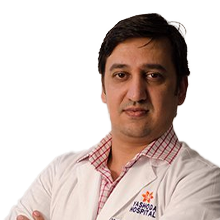Yashoda Institute of Nuclear Medicine
Nuclear medicine is a specialty that involves non-invasive, painless, safe and cost-effective modalities of medical diagnosis and treatment. Nuclear and molecular medicine imaging and therapies have paved paths to offer best medical care for serious conditions such as benign tumors and cancers, thyroid and other endocrine abnormalities, and neurodegenerative diseases.
Nuclear medicine imaging:
Modern-day diagnostic procedures explore the utility of radiation and radio-pharmaceuticals to take diagnosis one step forward.
In nuclear medicine, radioactive tracers are used in small quantities (administered to the patient through IV or oral route or inhalation) to visualize the real-time function of a body. These radiopharmaceuticals, when administered to the patient, can be recorded using special cameras. The resulting images provide accurate detailing and contrast of the affected areas in the body. Nuclear medicine and molecular imaging help to create high-quality images of the abnormalities, which are either deep-rooted or camouflaged. Thus, nuclear medicine imaging obviates the need for expensive diagnostic procedures and invasive surgeries.
Nuclear medicine imaging (or radionuclide imaging) identifies the functional abnormalities such as areas of varying activity in the brain, blood flow to the respective organ, pumping efficiency of the heart, areas of bone healing, cancer progress.
The images can point out the defects at the molecular level, which are the earliest signs of diseases. Thus, nuclear medicine imaging becomes an essential part of cancer diagnosis as it helps in the staging of cancer and earliest detection of metastases (the spread of cancer).
Nuclear medicine therapy:
Nuclear medicine physicians also use radionucleotides (radiopharmaceuticals) to treat cancer and other medical conditions such as thyroid diseases. Radio-pharmaceuticals are available as oral formulations, injectables and inhalants. These radiopharmaceuticals are different from those used for nuclear medicine imaging (gamma emitters), in a way that offers better biological utility and short penetration into the tissue (alpha or beta emitters).
Benign tumors (localized) and metastasized cancers can be targeted with radionucleotides that are laced with protein molecules such as an antigen, receptors in the body. Nuclear medicine therapy thus offers greater effectiveness without affecting the healthy tissues and organs using very small amounts of radionucleotides.
Targeted radionucleotide therapies such as peptide receptor radionucleotide therapy (PRPT) deliver energetic radionucleotides to destroy specific cancer cells thereby sparing the normal cells.
Radioimmunotherapy (RIT) is a combination of radionucleotides and immunotherapy. It is an injectable offered on outpatient basis for cancer patients who do not respond to chemotherapy. This modality offers targeted delivery wherein the specific antibodies are laced with radionucleotides that deliver targeted cytotoxic radiation to the cancerous or other targeted tissues.






 Appointment
Appointment WhatsApp
WhatsApp Call
Call More
More

